FNSACC506 Implement and Maintain Internal Control Procedures
VerifiedAdded on 2020/04/21
|6
|2156
|96
Homework Assignment
AI Summary
This document presents a comprehensive solution to an accounting assignment, specifically addressing the unit FNSACC506: Implement and Maintain Internal Control Procedures, for the Diploma of Accounting program at Australian Harbour International College. The assignment covers crucial aspects of financial reporting, emphasizing the importance of adequate disclosure by directors to mitigate errors and fraud, and provide stakeholders with a clear financial overview. It delves into ethical values, corporate governance mechanisms, and the significance of adhering to ATO reporting deadlines. The solution also explores the influence of segregation of duties on work practices, the consultation and involvement of stakeholders, and the differences between internal and external auditing. Finally, it outlines the key components of internal control, ensuring a thorough understanding of accounting principles and practices.
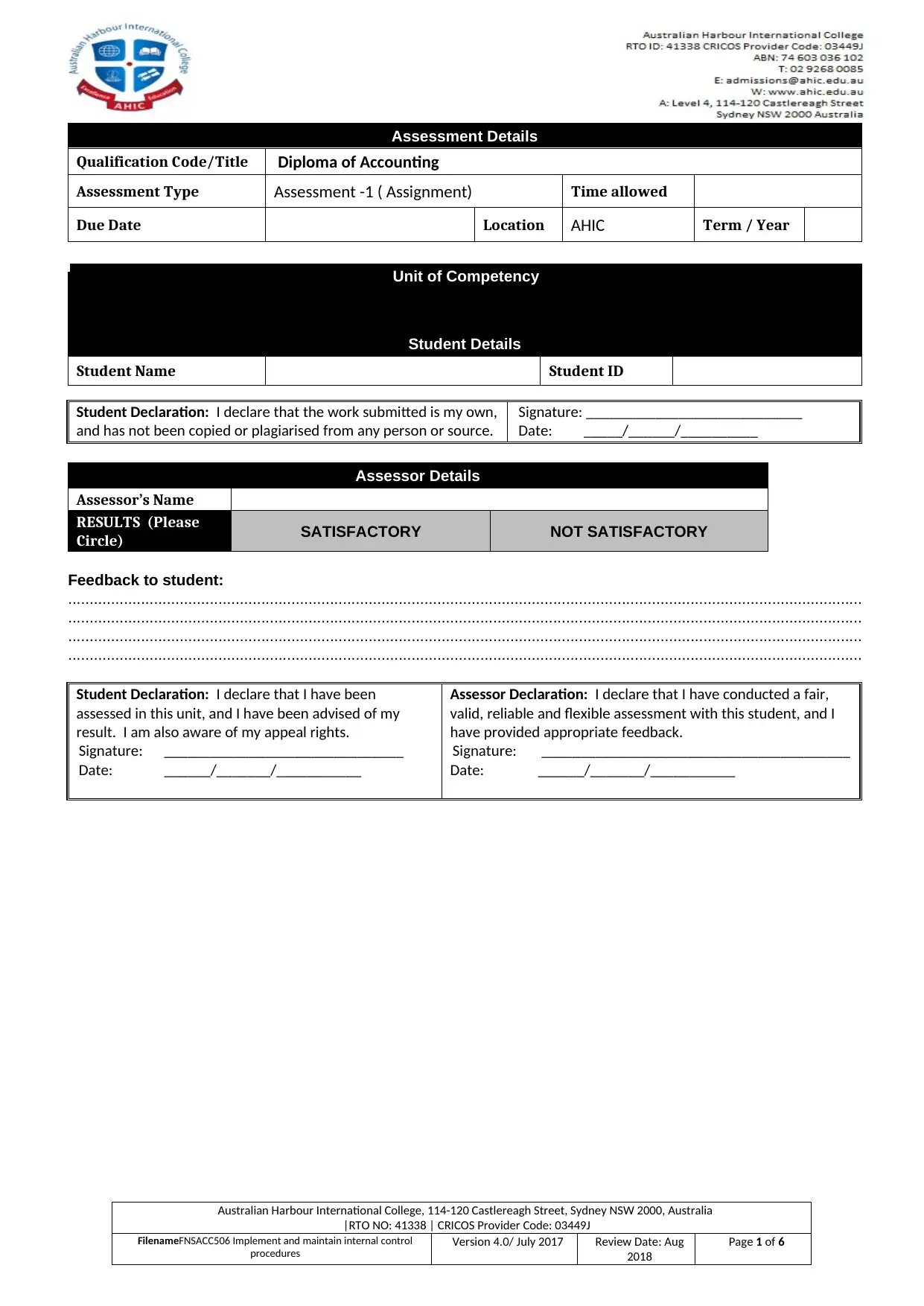
Assessment Details
Qualification Code/Title Diploma of Accounting
Assessment Type Assessment -1 ( Assignment) Time allowed
Due Date Location AHIC Term / Year
Student Details
Student Name Student ID
Student Declaration: I declare that the work submitted is my own,
and has not been copied or plagiarised from any person or source.
Signature: ____________________________
Date: _____/______/__________
Assessor Details
Assessor’s Name
RESULTS (Please
Circle) SATISFACTORY NOT SATISFACTORY
Feedback to student:
.........................................................................................................................................................................................
.........................................................................................................................................................................................
.........................................................................................................................................................................................
.........................................................................................................................................................................................
Student Declaration: I declare that I have been
assessed in this unit, and I have been advised of my
result. I am also aware of my appeal rights.
Signature: _______________________________
Date: ______/_______/___________
Assessor Declaration: I declare that I have conducted a fair,
valid, reliable and flexible assessment with this student, and I
have provided appropriate feedback.
Signature: ________________________________________
Date: ______/_______/___________
Australian Harbour International College, 114-120 Castlereagh Street, Sydney NSW 2000, Australia
|RTO NO: 41338 | CRICOS Provider Code: 03449J
FilenameFNSACC506 Implement and maintain internal control
procedures
Version 4.0/ July 2017 Review Date: Aug
2018
Page 1 of 6
Unit of Competency
National Code/Title FNSACC506 Implement and maintain internal control procedures
Qualification Code/Title Diploma of Accounting
Assessment Type Assessment -1 ( Assignment) Time allowed
Due Date Location AHIC Term / Year
Student Details
Student Name Student ID
Student Declaration: I declare that the work submitted is my own,
and has not been copied or plagiarised from any person or source.
Signature: ____________________________
Date: _____/______/__________
Assessor Details
Assessor’s Name
RESULTS (Please
Circle) SATISFACTORY NOT SATISFACTORY
Feedback to student:
.........................................................................................................................................................................................
.........................................................................................................................................................................................
.........................................................................................................................................................................................
.........................................................................................................................................................................................
Student Declaration: I declare that I have been
assessed in this unit, and I have been advised of my
result. I am also aware of my appeal rights.
Signature: _______________________________
Date: ______/_______/___________
Assessor Declaration: I declare that I have conducted a fair,
valid, reliable and flexible assessment with this student, and I
have provided appropriate feedback.
Signature: ________________________________________
Date: ______/_______/___________
Australian Harbour International College, 114-120 Castlereagh Street, Sydney NSW 2000, Australia
|RTO NO: 41338 | CRICOS Provider Code: 03449J
FilenameFNSACC506 Implement and maintain internal control
procedures
Version 4.0/ July 2017 Review Date: Aug
2018
Page 1 of 6
Unit of Competency
National Code/Title FNSACC506 Implement and maintain internal control procedures
Paraphrase This Document
Need a fresh take? Get an instant paraphrase of this document with our AI Paraphraser
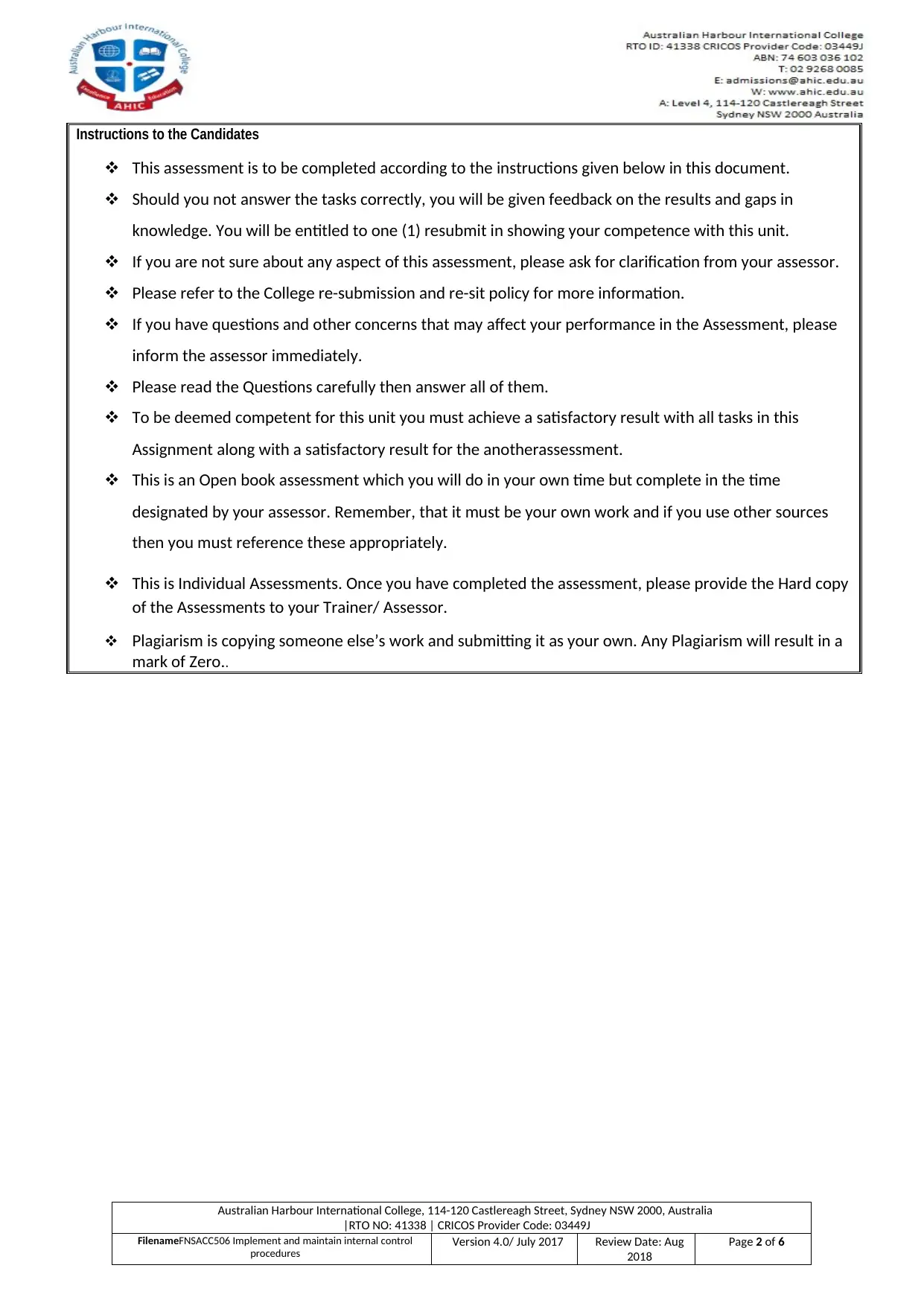
Instructions to the Candidates
This assessment is to be completed according to the instructions given below in this document.
Should you not answer the tasks correctly, you will be given feedback on the results and gaps in
knowledge. You will be entitled to one (1) resubmit in showing your competence with this unit.
If you are not sure about any aspect of this assessment, please ask for clarification from your assessor.
Please refer to the College re-submission and re-sit policy for more information.
If you have questions and other concerns that may affect your performance in the Assessment, please
inform the assessor immediately.
Please read the Questions carefully then answer all of them.
To be deemed competent for this unit you must achieve a satisfactory result with all tasks in this
Assignment along with a satisfactory result for the anotherassessment.
This is an Open book assessment which you will do in your own time but complete in the time
designated by your assessor. Remember, that it must be your own work and if you use other sources
then you must reference these appropriately.
This is Individual Assessments. Once you have completed the assessment, please provide the Hard copy
of the Assessments to your Trainer/ Assessor.
Plagiarism is copying someone else’s work and submitting it as your own. Any Plagiarism will result in a
mark of Zero..
Australian Harbour International College, 114-120 Castlereagh Street, Sydney NSW 2000, Australia
|RTO NO: 41338 | CRICOS Provider Code: 03449J
FilenameFNSACC506 Implement and maintain internal control
procedures
Version 4.0/ July 2017 Review Date: Aug
2018
Page 2 of 6
This assessment is to be completed according to the instructions given below in this document.
Should you not answer the tasks correctly, you will be given feedback on the results and gaps in
knowledge. You will be entitled to one (1) resubmit in showing your competence with this unit.
If you are not sure about any aspect of this assessment, please ask for clarification from your assessor.
Please refer to the College re-submission and re-sit policy for more information.
If you have questions and other concerns that may affect your performance in the Assessment, please
inform the assessor immediately.
Please read the Questions carefully then answer all of them.
To be deemed competent for this unit you must achieve a satisfactory result with all tasks in this
Assignment along with a satisfactory result for the anotherassessment.
This is an Open book assessment which you will do in your own time but complete in the time
designated by your assessor. Remember, that it must be your own work and if you use other sources
then you must reference these appropriately.
This is Individual Assessments. Once you have completed the assessment, please provide the Hard copy
of the Assessments to your Trainer/ Assessor.
Plagiarism is copying someone else’s work and submitting it as your own. Any Plagiarism will result in a
mark of Zero..
Australian Harbour International College, 114-120 Castlereagh Street, Sydney NSW 2000, Australia
|RTO NO: 41338 | CRICOS Provider Code: 03449J
FilenameFNSACC506 Implement and maintain internal control
procedures
Version 4.0/ July 2017 Review Date: Aug
2018
Page 2 of 6
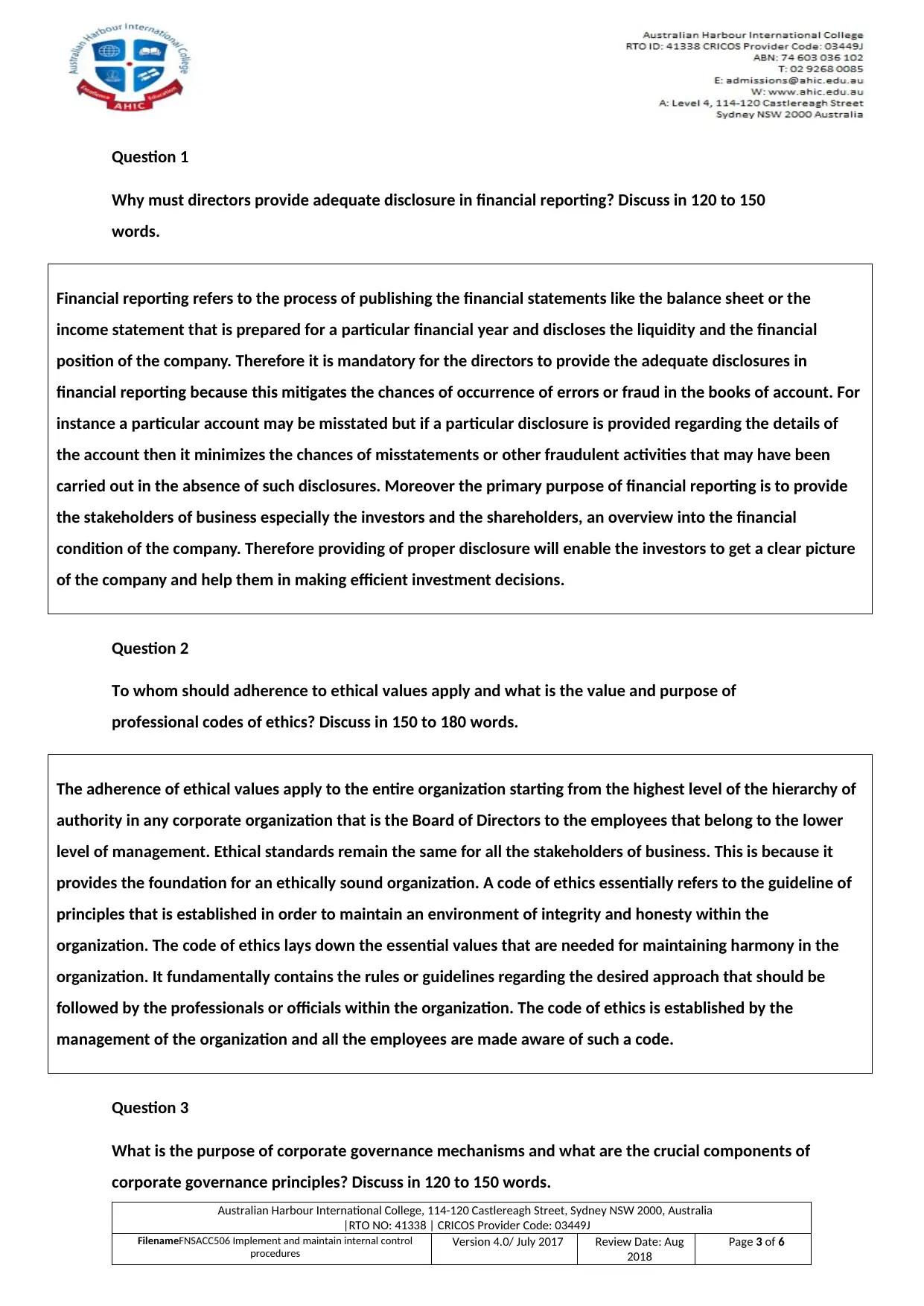
Question 1
Why must directors provide adequate disclosure in financial reporting? Discuss in 120 to 150
words.
Financial reporting refers to the process of publishing the financial statements like the balance sheet or the
income statement that is prepared for a particular financial year and discloses the liquidity and the financial
position of the company. Therefore it is mandatory for the directors to provide the adequate disclosures in
financial reporting because this mitigates the chances of occurrence of errors or fraud in the books of account. For
instance a particular account may be misstated but if a particular disclosure is provided regarding the details of
the account then it minimizes the chances of misstatements or other fraudulent activities that may have been
carried out in the absence of such disclosures. Moreover the primary purpose of financial reporting is to provide
the stakeholders of business especially the investors and the shareholders, an overview into the financial
condition of the company. Therefore providing of proper disclosure will enable the investors to get a clear picture
of the company and help them in making efficient investment decisions.
Question 2
To whom should adherence to ethical values apply and what is the value and purpose of
professional codes of ethics? Discuss in 150 to 180 words.
The adherence of ethical values apply to the entire organization starting from the highest level of the hierarchy of
authority in any corporate organization that is the Board of Directors to the employees that belong to the lower
level of management. Ethical standards remain the same for all the stakeholders of business. This is because it
provides the foundation for an ethically sound organization. A code of ethics essentially refers to the guideline of
principles that is established in order to maintain an environment of integrity and honesty within the
organization. The code of ethics lays down the essential values that are needed for maintaining harmony in the
organization. It fundamentally contains the rules or guidelines regarding the desired approach that should be
followed by the professionals or officials within the organization. The code of ethics is established by the
management of the organization and all the employees are made aware of such a code.
Question 3
What is the purpose of corporate governance mechanisms and what are the crucial components of
corporate governance principles? Discuss in 120 to 150 words.
Australian Harbour International College, 114-120 Castlereagh Street, Sydney NSW 2000, Australia
|RTO NO: 41338 | CRICOS Provider Code: 03449J
FilenameFNSACC506 Implement and maintain internal control
procedures
Version 4.0/ July 2017 Review Date: Aug
2018
Page 3 of 6
Why must directors provide adequate disclosure in financial reporting? Discuss in 120 to 150
words.
Financial reporting refers to the process of publishing the financial statements like the balance sheet or the
income statement that is prepared for a particular financial year and discloses the liquidity and the financial
position of the company. Therefore it is mandatory for the directors to provide the adequate disclosures in
financial reporting because this mitigates the chances of occurrence of errors or fraud in the books of account. For
instance a particular account may be misstated but if a particular disclosure is provided regarding the details of
the account then it minimizes the chances of misstatements or other fraudulent activities that may have been
carried out in the absence of such disclosures. Moreover the primary purpose of financial reporting is to provide
the stakeholders of business especially the investors and the shareholders, an overview into the financial
condition of the company. Therefore providing of proper disclosure will enable the investors to get a clear picture
of the company and help them in making efficient investment decisions.
Question 2
To whom should adherence to ethical values apply and what is the value and purpose of
professional codes of ethics? Discuss in 150 to 180 words.
The adherence of ethical values apply to the entire organization starting from the highest level of the hierarchy of
authority in any corporate organization that is the Board of Directors to the employees that belong to the lower
level of management. Ethical standards remain the same for all the stakeholders of business. This is because it
provides the foundation for an ethically sound organization. A code of ethics essentially refers to the guideline of
principles that is established in order to maintain an environment of integrity and honesty within the
organization. The code of ethics lays down the essential values that are needed for maintaining harmony in the
organization. It fundamentally contains the rules or guidelines regarding the desired approach that should be
followed by the professionals or officials within the organization. The code of ethics is established by the
management of the organization and all the employees are made aware of such a code.
Question 3
What is the purpose of corporate governance mechanisms and what are the crucial components of
corporate governance principles? Discuss in 120 to 150 words.
Australian Harbour International College, 114-120 Castlereagh Street, Sydney NSW 2000, Australia
|RTO NO: 41338 | CRICOS Provider Code: 03449J
FilenameFNSACC506 Implement and maintain internal control
procedures
Version 4.0/ July 2017 Review Date: Aug
2018
Page 3 of 6
⊘ This is a preview!⊘
Do you want full access?
Subscribe today to unlock all pages.

Trusted by 1+ million students worldwide
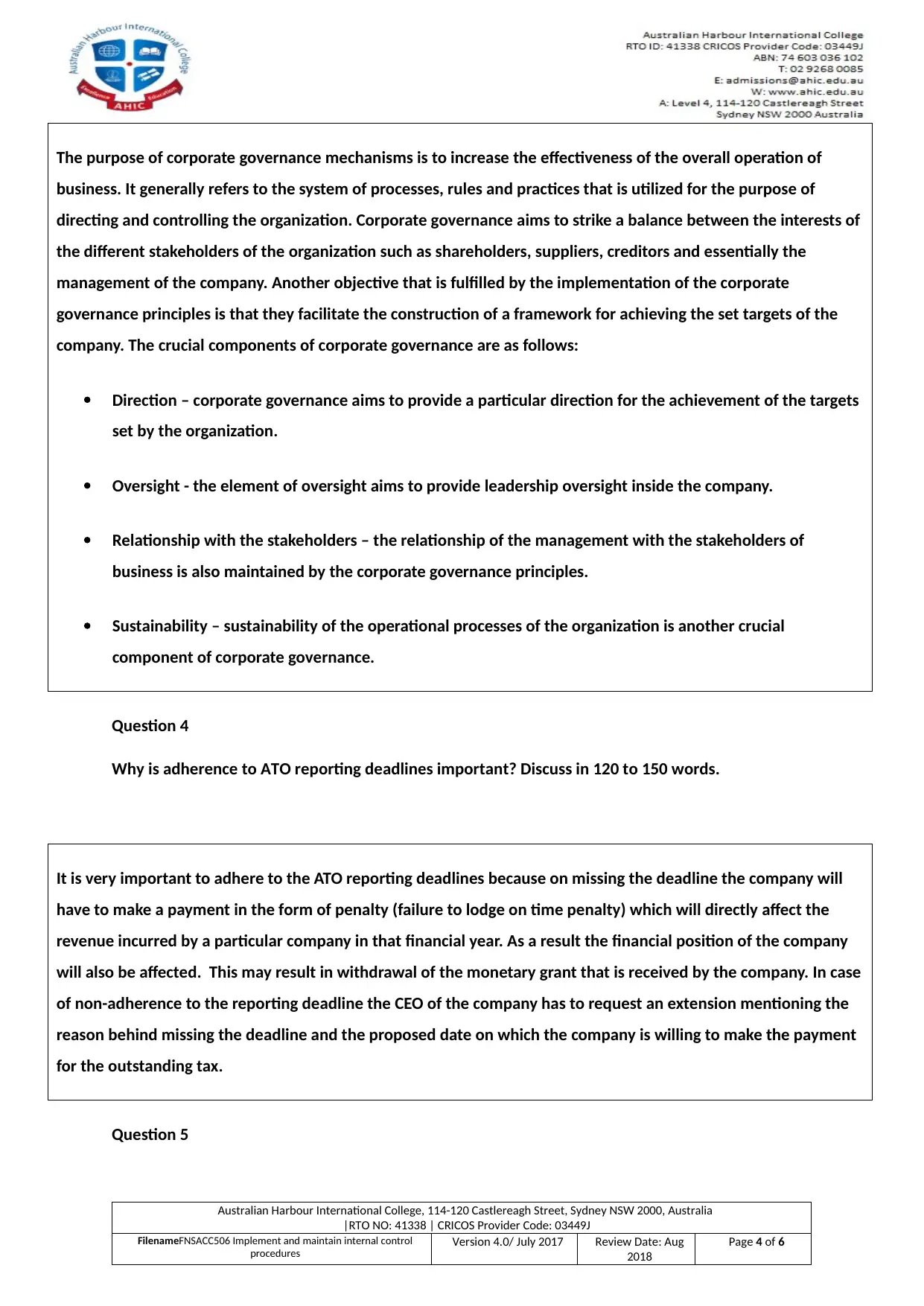
The purpose of corporate governance mechanisms is to increase the effectiveness of the overall operation of
business. It generally refers to the system of processes, rules and practices that is utilized for the purpose of
directing and controlling the organization. Corporate governance aims to strike a balance between the interests of
the different stakeholders of the organization such as shareholders, suppliers, creditors and essentially the
management of the company. Another objective that is fulfilled by the implementation of the corporate
governance principles is that they facilitate the construction of a framework for achieving the set targets of the
company. The crucial components of corporate governance are as follows:
Direction – corporate governance aims to provide a particular direction for the achievement of the targets
set by the organization.
Oversight - the element of oversight aims to provide leadership oversight inside the company.
Relationship with the stakeholders – the relationship of the management with the stakeholders of
business is also maintained by the corporate governance principles.
Sustainability – sustainability of the operational processes of the organization is another crucial
component of corporate governance.
Question 4
Why is adherence to ATO reporting deadlines important? Discuss in 120 to 150 words.
It is very important to adhere to the ATO reporting deadlines because on missing the deadline the company will
have to make a payment in the form of penalty (failure to lodge on time penalty) which will directly affect the
revenue incurred by a particular company in that financial year. As a result the financial position of the company
will also be affected. This may result in withdrawal of the monetary grant that is received by the company. In case
of non-adherence to the reporting deadline the CEO of the company has to request an extension mentioning the
reason behind missing the deadline and the proposed date on which the company is willing to make the payment
for the outstanding tax.
Question 5
Australian Harbour International College, 114-120 Castlereagh Street, Sydney NSW 2000, Australia
|RTO NO: 41338 | CRICOS Provider Code: 03449J
FilenameFNSACC506 Implement and maintain internal control
procedures
Version 4.0/ July 2017 Review Date: Aug
2018
Page 4 of 6
business. It generally refers to the system of processes, rules and practices that is utilized for the purpose of
directing and controlling the organization. Corporate governance aims to strike a balance between the interests of
the different stakeholders of the organization such as shareholders, suppliers, creditors and essentially the
management of the company. Another objective that is fulfilled by the implementation of the corporate
governance principles is that they facilitate the construction of a framework for achieving the set targets of the
company. The crucial components of corporate governance are as follows:
Direction – corporate governance aims to provide a particular direction for the achievement of the targets
set by the organization.
Oversight - the element of oversight aims to provide leadership oversight inside the company.
Relationship with the stakeholders – the relationship of the management with the stakeholders of
business is also maintained by the corporate governance principles.
Sustainability – sustainability of the operational processes of the organization is another crucial
component of corporate governance.
Question 4
Why is adherence to ATO reporting deadlines important? Discuss in 120 to 150 words.
It is very important to adhere to the ATO reporting deadlines because on missing the deadline the company will
have to make a payment in the form of penalty (failure to lodge on time penalty) which will directly affect the
revenue incurred by a particular company in that financial year. As a result the financial position of the company
will also be affected. This may result in withdrawal of the monetary grant that is received by the company. In case
of non-adherence to the reporting deadline the CEO of the company has to request an extension mentioning the
reason behind missing the deadline and the proposed date on which the company is willing to make the payment
for the outstanding tax.
Question 5
Australian Harbour International College, 114-120 Castlereagh Street, Sydney NSW 2000, Australia
|RTO NO: 41338 | CRICOS Provider Code: 03449J
FilenameFNSACC506 Implement and maintain internal control
procedures
Version 4.0/ July 2017 Review Date: Aug
2018
Page 4 of 6
Paraphrase This Document
Need a fresh take? Get an instant paraphrase of this document with our AI Paraphraser
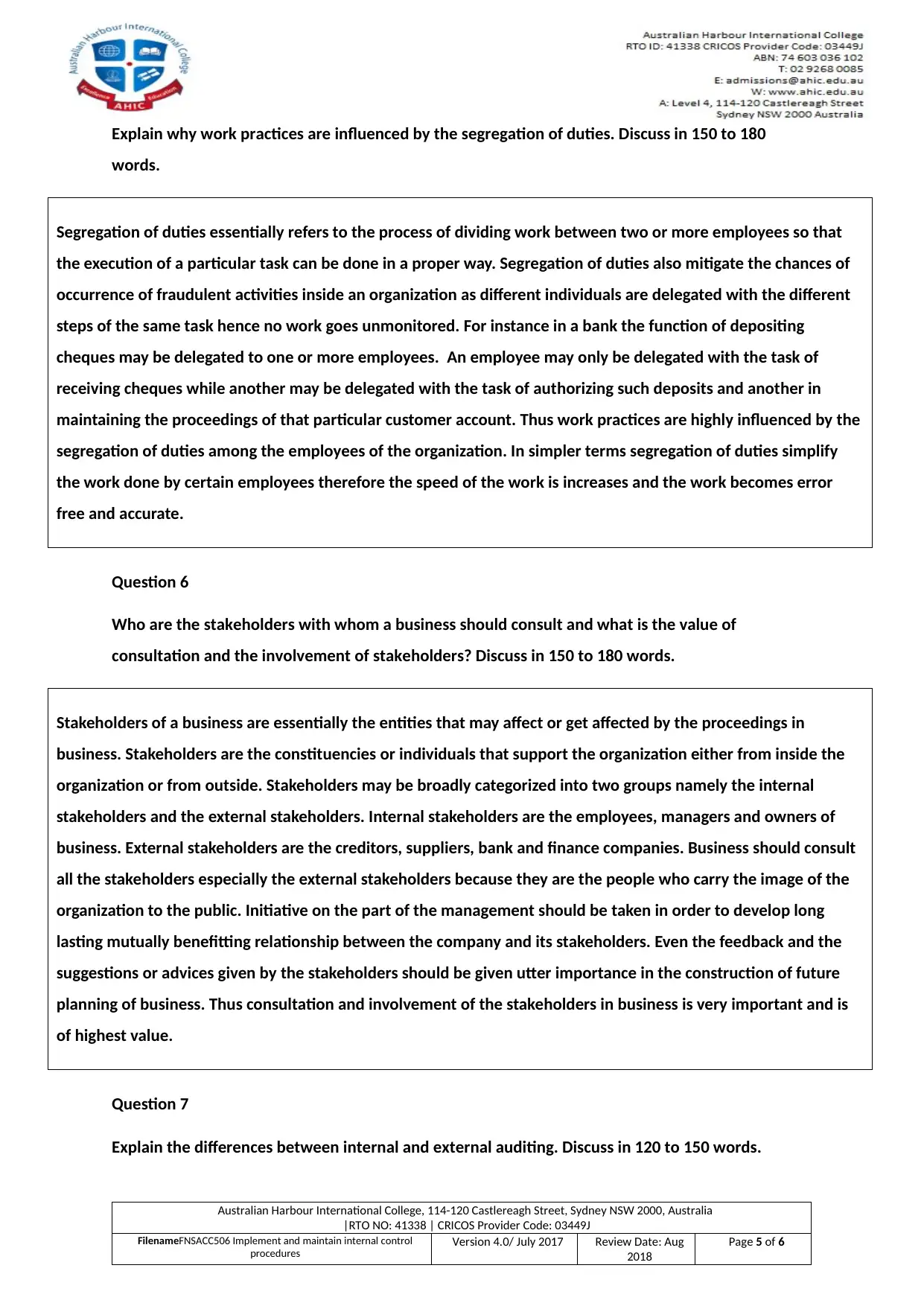
Explain why work practices are influenced by the segregation of duties. Discuss in 150 to 180
words.
Segregation of duties essentially refers to the process of dividing work between two or more employees so that
the execution of a particular task can be done in a proper way. Segregation of duties also mitigate the chances of
occurrence of fraudulent activities inside an organization as different individuals are delegated with the different
steps of the same task hence no work goes unmonitored. For instance in a bank the function of depositing
cheques may be delegated to one or more employees. An employee may only be delegated with the task of
receiving cheques while another may be delegated with the task of authorizing such deposits and another in
maintaining the proceedings of that particular customer account. Thus work practices are highly influenced by the
segregation of duties among the employees of the organization. In simpler terms segregation of duties simplify
the work done by certain employees therefore the speed of the work is increases and the work becomes error
free and accurate.
Question 6
Who are the stakeholders with whom a business should consult and what is the value of
consultation and the involvement of stakeholders? Discuss in 150 to 180 words.
Stakeholders of a business are essentially the entities that may affect or get affected by the proceedings in
business. Stakeholders are the constituencies or individuals that support the organization either from inside the
organization or from outside. Stakeholders may be broadly categorized into two groups namely the internal
stakeholders and the external stakeholders. Internal stakeholders are the employees, managers and owners of
business. External stakeholders are the creditors, suppliers, bank and finance companies. Business should consult
all the stakeholders especially the external stakeholders because they are the people who carry the image of the
organization to the public. Initiative on the part of the management should be taken in order to develop long
lasting mutually benefitting relationship between the company and its stakeholders. Even the feedback and the
suggestions or advices given by the stakeholders should be given utter importance in the construction of future
planning of business. Thus consultation and involvement of the stakeholders in business is very important and is
of highest value.
Question 7
Explain the differences between internal and external auditing. Discuss in 120 to 150 words.
Australian Harbour International College, 114-120 Castlereagh Street, Sydney NSW 2000, Australia
|RTO NO: 41338 | CRICOS Provider Code: 03449J
FilenameFNSACC506 Implement and maintain internal control
procedures
Version 4.0/ July 2017 Review Date: Aug
2018
Page 5 of 6
words.
Segregation of duties essentially refers to the process of dividing work between two or more employees so that
the execution of a particular task can be done in a proper way. Segregation of duties also mitigate the chances of
occurrence of fraudulent activities inside an organization as different individuals are delegated with the different
steps of the same task hence no work goes unmonitored. For instance in a bank the function of depositing
cheques may be delegated to one or more employees. An employee may only be delegated with the task of
receiving cheques while another may be delegated with the task of authorizing such deposits and another in
maintaining the proceedings of that particular customer account. Thus work practices are highly influenced by the
segregation of duties among the employees of the organization. In simpler terms segregation of duties simplify
the work done by certain employees therefore the speed of the work is increases and the work becomes error
free and accurate.
Question 6
Who are the stakeholders with whom a business should consult and what is the value of
consultation and the involvement of stakeholders? Discuss in 150 to 180 words.
Stakeholders of a business are essentially the entities that may affect or get affected by the proceedings in
business. Stakeholders are the constituencies or individuals that support the organization either from inside the
organization or from outside. Stakeholders may be broadly categorized into two groups namely the internal
stakeholders and the external stakeholders. Internal stakeholders are the employees, managers and owners of
business. External stakeholders are the creditors, suppliers, bank and finance companies. Business should consult
all the stakeholders especially the external stakeholders because they are the people who carry the image of the
organization to the public. Initiative on the part of the management should be taken in order to develop long
lasting mutually benefitting relationship between the company and its stakeholders. Even the feedback and the
suggestions or advices given by the stakeholders should be given utter importance in the construction of future
planning of business. Thus consultation and involvement of the stakeholders in business is very important and is
of highest value.
Question 7
Explain the differences between internal and external auditing. Discuss in 120 to 150 words.
Australian Harbour International College, 114-120 Castlereagh Street, Sydney NSW 2000, Australia
|RTO NO: 41338 | CRICOS Provider Code: 03449J
FilenameFNSACC506 Implement and maintain internal control
procedures
Version 4.0/ July 2017 Review Date: Aug
2018
Page 5 of 6
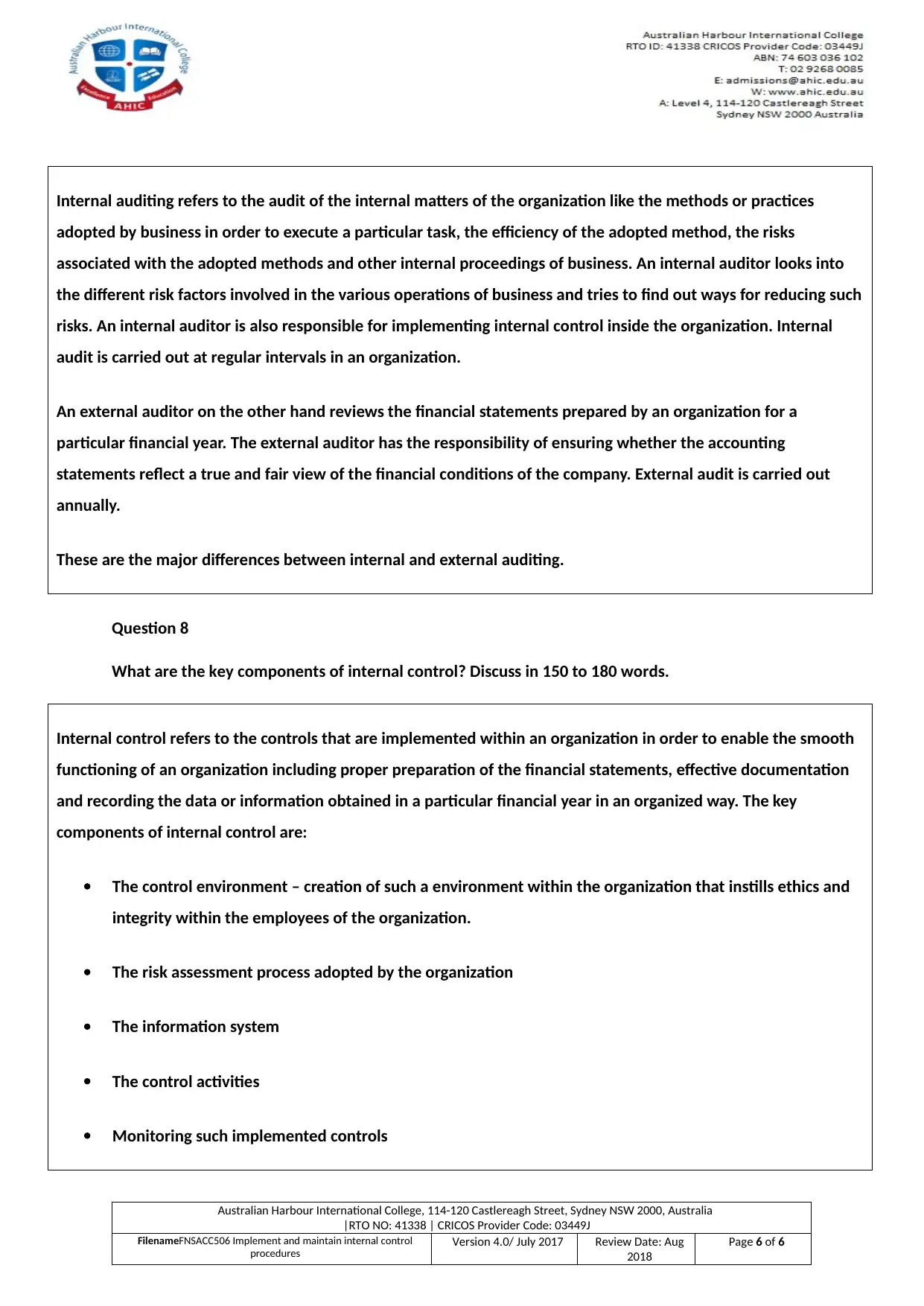
Internal auditing refers to the audit of the internal matters of the organization like the methods or practices
adopted by business in order to execute a particular task, the efficiency of the adopted method, the risks
associated with the adopted methods and other internal proceedings of business. An internal auditor looks into
the different risk factors involved in the various operations of business and tries to find out ways for reducing such
risks. An internal auditor is also responsible for implementing internal control inside the organization. Internal
audit is carried out at regular intervals in an organization.
An external auditor on the other hand reviews the financial statements prepared by an organization for a
particular financial year. The external auditor has the responsibility of ensuring whether the accounting
statements reflect a true and fair view of the financial conditions of the company. External audit is carried out
annually.
These are the major differences between internal and external auditing.
Question 8
What are the key components of internal control? Discuss in 150 to 180 words.
Internal control refers to the controls that are implemented within an organization in order to enable the smooth
functioning of an organization including proper preparation of the financial statements, effective documentation
and recording the data or information obtained in a particular financial year in an organized way. The key
components of internal control are:
The control environment – creation of such a environment within the organization that instills ethics and
integrity within the employees of the organization.
The risk assessment process adopted by the organization
The information system
The control activities
Monitoring such implemented controls
Australian Harbour International College, 114-120 Castlereagh Street, Sydney NSW 2000, Australia
|RTO NO: 41338 | CRICOS Provider Code: 03449J
FilenameFNSACC506 Implement and maintain internal control
procedures
Version 4.0/ July 2017 Review Date: Aug
2018
Page 6 of 6
adopted by business in order to execute a particular task, the efficiency of the adopted method, the risks
associated with the adopted methods and other internal proceedings of business. An internal auditor looks into
the different risk factors involved in the various operations of business and tries to find out ways for reducing such
risks. An internal auditor is also responsible for implementing internal control inside the organization. Internal
audit is carried out at regular intervals in an organization.
An external auditor on the other hand reviews the financial statements prepared by an organization for a
particular financial year. The external auditor has the responsibility of ensuring whether the accounting
statements reflect a true and fair view of the financial conditions of the company. External audit is carried out
annually.
These are the major differences between internal and external auditing.
Question 8
What are the key components of internal control? Discuss in 150 to 180 words.
Internal control refers to the controls that are implemented within an organization in order to enable the smooth
functioning of an organization including proper preparation of the financial statements, effective documentation
and recording the data or information obtained in a particular financial year in an organized way. The key
components of internal control are:
The control environment – creation of such a environment within the organization that instills ethics and
integrity within the employees of the organization.
The risk assessment process adopted by the organization
The information system
The control activities
Monitoring such implemented controls
Australian Harbour International College, 114-120 Castlereagh Street, Sydney NSW 2000, Australia
|RTO NO: 41338 | CRICOS Provider Code: 03449J
FilenameFNSACC506 Implement and maintain internal control
procedures
Version 4.0/ July 2017 Review Date: Aug
2018
Page 6 of 6
⊘ This is a preview!⊘
Do you want full access?
Subscribe today to unlock all pages.

Trusted by 1+ million students worldwide
1 out of 6
Related Documents
Your All-in-One AI-Powered Toolkit for Academic Success.
+13062052269
info@desklib.com
Available 24*7 on WhatsApp / Email
![[object Object]](/_next/static/media/star-bottom.7253800d.svg)
Unlock your academic potential
Copyright © 2020–2026 A2Z Services. All Rights Reserved. Developed and managed by ZUCOL.





